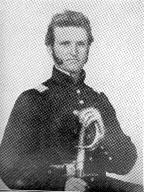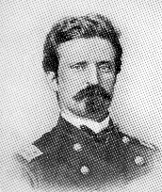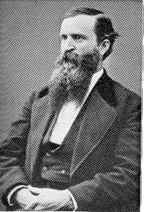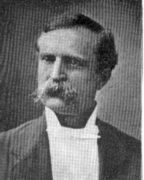| Born on June 12, 1833 near the
community of Dayton, Ohio, James B. Weaver as a child moved with his parents
to Michigan in 1835 and into Iowa. One of the earliest white families to
settle in Davis County, Iowa, they became somewhat prominent in public
affairs, his father serving as clerk in the county court at Bloomfield.
After common school, he studied law in 1853-1855, generally under Samuel McAchran, a member of Bloomfield's Brotherhood of the Union. He also graduated from the Cincinnati Law School in April 1856 and returned to . There, he participated in the local Democratic party until the passage of the Kansas-Nebraska Act after which he became prominent in the local organization of the Republican insurgency of the 1850s. He also played an important role in the formation of the party throughout Iowa and attended the national convention that nominated Abraham Lincoln in 1860.
After the Civil War, Weaver was elected district attorney for the second judicial district in 1866 and was appointed Federal assessor of internal revenue on March 25, 1867 serving until May 20, 1873. Republicans regarded him as a viable candidate for statewide office but for his persistent hostility to the railroads and interest in social reform. Still, Weaver remained loyal to the party until its president sent Federal troops against strikers in the Summer of 1877.
In 1880, the insurgents nominated Weaver for president along with B.J. Chambers of Texas for Vice President. Weaver promised in his Letter of Acceptance to campaign actively on his own behalf. Supported by many of the Liberal Leaguers and the Socialistic Labor Party, he defended the rights of workers to organize, declared for woman's suffrage, and addressed other issues as well as "the money question". In his unique style, Weaver carried his message directly to the voters from Maine and Michigan to southern Alabama and western Arkansas where he denounced the Democratic denial of black rights and the Republican betrayal of Reconstruction. By the close of the campaign, the mainstream newspapers had simply ceased to cover his activities.
Through the revival of third-party activities in 1886-87, he promoted insurgent unity and a focus on the broader social questions. In 1888, he supported the Union Labor ticket headed by A.J. Streeter. Thereafter, he also joined a local Nationalist Club, admirers of Looking Backwards, the famous socialist novel by Edward Bellamy. With the explosive revival of the third-party movement around 1890, Weaver became a natural and vigorous spokesman for the Peoples' Party. In 1892, as the Populist candidate for president, Weaver not only issued his own book-length Call to Action! but again stumped the country, calling for a "free and fair ballot" in the South and civil rights for black Americans. He won 22 electoral votes, polling roughly a million and a half votes, which represented between 25%-45% in parts of the country in a three-way race. After 1895 he lived in Colfax, Iowa and was a mayor of the city for two years. With other northern Populists, he came to favor a fusion experiment with the Democratic party in 1896 and endorsed William Jennings Bryan. The result marked the collapse of the insurgent movement outside of the South and its severe weakening there. Some of the more radical Populists, however, turned to the now-independent campaign of the Socialist Labor Party. Like other leaders of the former
insurgency, Weaver opposed the 1898 U.S. decision to join the other industrial
powers in their scramble for overseas colonies, but there was little the
devastated movement could then do to prevent it. Weaver served s
mayor of Colfax, Iowa 1901-1903. He died in Des Moines, Iowa, February
6, 1912 and was buried in Woodland Cemetery.
Bibliography. Biographical Directory of the United States Congress, 1774 - Present and Congressional Biographical Directory online; Dictionary of American Biography; Colbert, Thomas Burnell. "Political Fusion in Iowa: The Election of James B. Weaver to Congress in 1878." Arizona and the West 20 (Spring 1978): 25-40; Haynes, Fred Emory. James Baird Weaver. Iowa City: State Historical Society of Iowa, 1916. |
 When
war came in April 1861, Weaver enlisted as a private in the Bloomfield
volunteer company which elected him a lieutenant. This became Company G
of the Second Iowa Infantry. Weaver won promotion to captain after the
unit participated in heavy fighting at
When
war came in April 1861, Weaver enlisted as a private in the Bloomfield
volunteer company which elected him a lieutenant. This became Company G
of the Second Iowa Infantry. Weaver won promotion to captain after the
unit participated in heavy fighting at  Postdated
to July 25, 1862, his promotion to major came on the eve of the October
battle at
Postdated
to July 25, 1862, his promotion to major came on the eve of the October
battle at  Thereafter,
Weaver joined the local
Thereafter,
Weaver joined the local  In
the wake of the campaign, Weaver persisted in his efforts to promote insurgent
politics. Although unsuccessful in his 1882 bid to ake his seat in Congress,
he helped convince the Greenbackers not to divide the third-party movement
in 1884 but to join with the
In
the wake of the campaign, Weaver persisted in his efforts to promote insurgent
politics. Although unsuccessful in his 1882 bid to ake his seat in Congress,
he helped convince the Greenbackers not to divide the third-party movement
in 1884 but to join with the